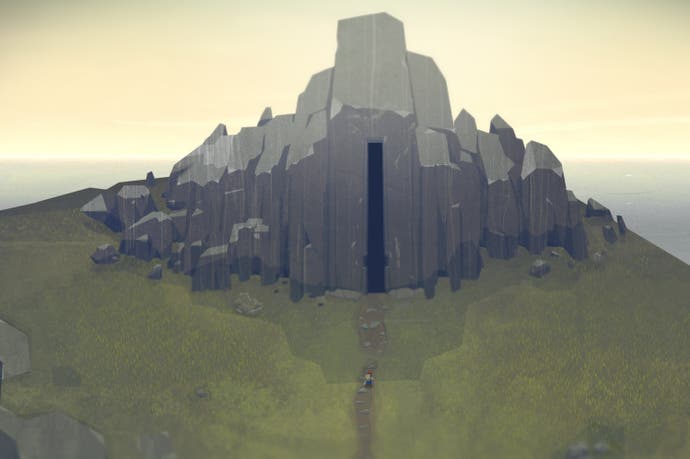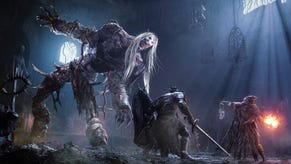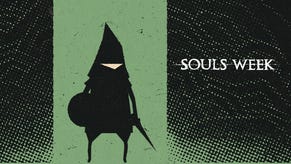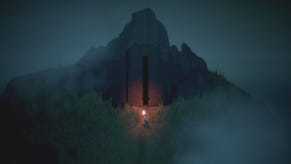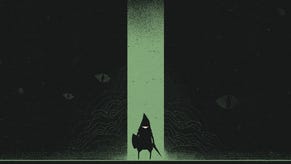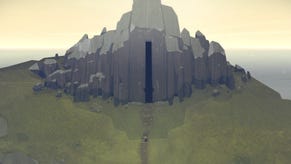Deep, deep down: Exploring Capybara's Xbox One-exclusive roguelike Below
Microsoft Game Studios has been "really cool" as a publisher.
Microsoft's been the industry's punching bag over the last week, but beneath the used game debate, exhorbitant price tag and archaic attitude towards self-publishing, boutique studio Capybara (of Sword & Sworcery and Clash of Heroes fame) is working on one of more intriguing indie games on the horizon. Below was one of E3's most brilliant surprises, and to find out more I caught up with Capybara president Nathan Vella to outline this mysterious upcoming project.
Simply put, Below is an action roguelike. It's portrayed from a top-down perspective and features real-time combat, permadeath, and randomly generated locales. In keeping true to the best of the genre's entries like The Binding of Isaac and Spelunky, Below will be hard. Very hard. But it'll also be fair.
"Below is our love-letter to roguelikes of yore, and to games that were about very difficult almost harsh combat that's very fair," explained Vella as we chatted about his game sitting in a carpeted hallway at E3's Los Angeles convention center. "Once you become familiar with the combat and the way that it works, anytime you die it will be be your fault, not the game's fault."
Harkening back to the old days, Below will offer new players no guidance whatsoever. "It's very much about exploration [and] aesthetics," Vella tells me. "There's no text in the game. There's no tutorials. There's no anything. There's no hand-holding. It's about learning in a lot of ways. It's about even exploring the combat system. I mean you're in the game exploring, but part of exploring is trying to figure out how to use your sword and your shield and your bow."
As you'd likely expect, combat plays a crucial role in Below. What's perhaps less expected is how minimalist it will be. While the game will contain a plethora of weapons, you'll never be able to carry more than two weapons and a shield at the same time. "You have a primary weapon and a defensive weapon and you can have one other weapon on your back. It's about knowing when to be defensive, knowing when to have your shield up, knowing when to attack and when to dodge."
"This is not a loot-grab have-a-treasure-chest-strapped-to-your-back type game. It's about giving people a chance to learn the combat."
Given Below's streamlined systems, I ask how Capybara will prevent this simple combat design from getting boring. "With the simplicity comes the opportunity for a tonne of depth. It's about exploring a very tight [move]set as deep as we can," Vella explains. "I think complexity is actually less engaging than simplicity, especially in combat systems."
"Don't get me wrong, I love me some Torchlights," he adds, "but you rarely get time to spend with a weapon because you have 10 new ones within the bat of an eye."
"You're not going to be stuck with the same weapon or anything like that. For us it's about saying, 'do you want to play with a sword and a shield, or do you want to play with a two-handed weapon, or do you want to be a ranged-type person? What if you're ranged and you're getting swarmed? How will you deal with that?'"
As he's explaining the simple yet deep combat system, I'm reminded of the two-button combat in both Punch-Out!! and Zelda 2. When I ask if it's anything like that, Vella says that he was actually inspired by a different Zelda game: Wind Waker.
"We use Wind Waker a lot [for inspiration], because Wind Waker is really about the one-on-one scenarios in combat rather than smashing stuff about," he explains. "Link has this set of tools, and in every situation you get into you learn very quickly how to use that set of tools. From there you can branch out into what other weapons are better for this scenario."
Still trying to wrap my head around it, I ask if it'll be anything like Monster Hunter where your great sword takes several seconds to swing, but as you become more adept at the fighting system and learn the enemies' tells you can adapt to the ridiculously sluggish controls. Vella laughs "Monster Hunter and I don't get along," and says that Below is "like the super-responsive version of that."
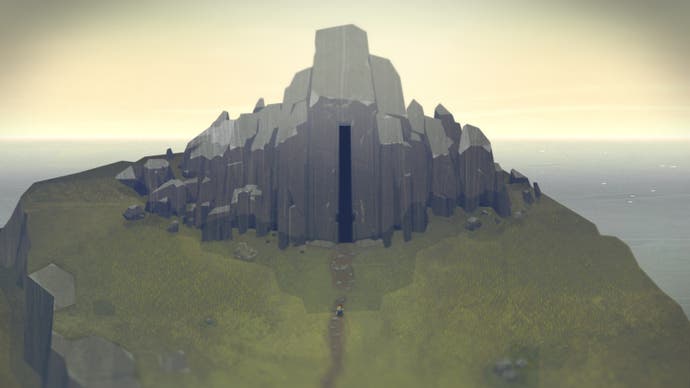
Below won't just be about exploring a combat system, but exploring a gorgeous lo-fi world. The game will transpire across a series of randomly generated single-screen environments. Anyone familiar with Capybara's roster will be aware that the studio is known for its finely crafted pre-rendered environments, which seem likely at odds with a randomly generated system, and Vella admits that that was one of the studio's greatest challenges in creating Below.
"[Making a] randomly generated system that can make [artist] Sylvain's art beautiful and look hand-crafted and feel like it was intentionally placed together, that's hard - it's so important to have these framed moments. Coercing the system is actually super important as well. I feel like that's a problem that we're very much in the process of or very close to having solved with the game. A lot of the stuff in the trailers is randomly generated and it's hard to tell."
When I ask about Below's plot, artist Sylvain Coutouly explains that "There's no real narrative, really... It's just the world itself that is going to give a story to your character." Vella, however, explains that there may not be an authored, ongoing plot, but he wants the environments to have a sense of history. "Everything from little details to entire rooms might add a thread to a storyline, that you yourself will have found through exploration."
Struggling for a frame of reference, I ask if it'll be along the lines of something like Fez or Dark Souls in this regard. The Capybara duo nods, "yeah," though Vella notes that "Even Fez has a little bit of the expository stuff with some of the characters pointing you in a direction," suggesting that Below will be even less plot-driven than that.
As Vella explains Below to me, I'm quite excited at the prospect of playing it, but a nagging concern remains. There's an elephant in the room: why Xbox One? Isn't Microsoft supposed to be busy sacrificing virgins or something?

Microsoft's certainly been suffering an image problem as of late, but for what it's worth, Vella and co. at Capybara have had nothing but good experiences with the publisher.
"We started working with them on Super Time Force," Vella explains. "They came up to us while IGF was being judged and said they really wanted this game that we'd been working on for like two weeks on their platform. We said, 'yeah, that's an interesting idea, but we've only been working on it one day a week. It's kind of a pet project. We've got other stuff going on.' And they said, 'okay, that's cool. Just keep working on it however you're working on it. We're not going to tell you how to work on it.' And we were like, 'actually we'd like to fund this ourselves,' and they were like 'yeah, no problem.'"
"So basically they gave us this space to make Time Force however we wanted. It's been a really good experience. So when we were thinking about platforms for this game, because our relationship was strong and they had given us that space, it was totally the easy thing to do - to knock on that same door and say 'Hey guys, you've been really cool to us. You want to see something else?'"
Microsoft apparently liked the idea so much that it supported Capybara through the development of its yet-to-be-released hardware. "That was quite early on. We'd been working on Xbox One for awhile and we've had access to some of the people putting some of the features in the system," Vella notes. "Having that kind of access is kind of awesome when you're making something that has certain components like multiplayer and some other fancy stuffs that we'll say is persistencey, but won't go into any detail on what that is. Having access to the people working on those features is a big win for developers."
That's all well and good for Capybara, but what about everyone else? Microsoft doesn't allow indies to self-publish. Did Capybara just luck out?
"I think it's a very mutually beneficial thing. I don't feel like it's a lopsided relationship in any way," he replies. "I think opportunities are not black and white. Sometimes there's a lot of potential in doing something that might not be what everybody thinks is the best. For us it's about having a partner who would fight for our game and get it on the big screen at an E3 announcement and that means a lot."
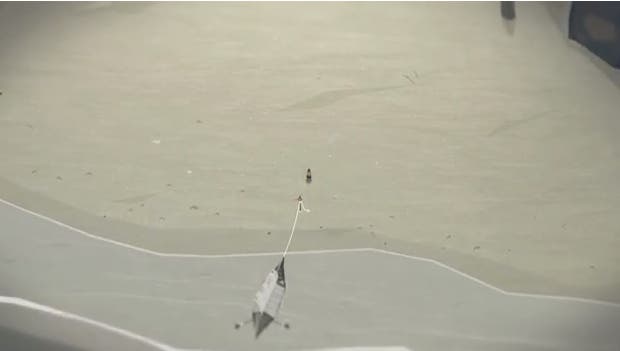
"I'm not saying anything about the values or lack thereof with self-publishing. Obviously we've published a lot of stuff. I think the emphasis on it is very important, but there are alternate avenues for people to take like thatgamecompany took with Journey or Jon Mak has done with Quesy [Sound Shapes]. There are alternate paths that don't rely on one way being the only way."
I ask Vella if he thinks Microsoft will follow in Sony's footsteps and make a big push towards indies. "I can't speak on them as a company because I don't have any access to what they're thinking or what they're saying," Vella replies. "All I know is how they deal with us. Respect where respect is due, they've been really cool... We've worked with a ton of bad publishers and I know a bad experience because we've had them before. And this has been a very good one."
So what about all the other indie devs that didn't have this experience. Certainly Team Meat and Jonathon Blow weren't too keen on the Redmond-based hardware manufacturer. "I'm not trying to downplay, or counter, or diminish anybody's experience at all. I just think we've got a partner who really believes in our stuff. And early on, as well," Vella explains.
Looking ahead, Vella couldn't comment on whether Below would be a timed exclusive or not, but he said he'd be open to the idea of working with other publishers on other platforms. "We've done pre-smart phone mobile, mobile, DS, XBLA, PSN, PC, Mac, Linux, started a Wii game that we never finished. That's one of the best parts about being an independent developer is being able to make relationships with people and choose if that's right or wrong for you and make path corrections. We've worked with a lot of different developers on a lot of different platforms and I've had almost unanimously good experiences on all of the platforms."
"We like working with cool people and there are a lot of cool people out there."
